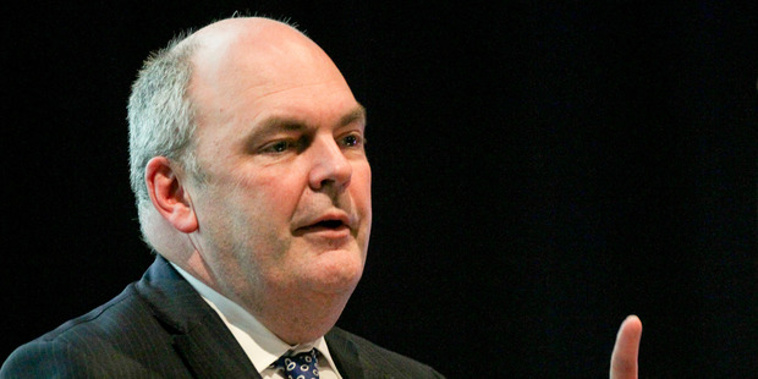
When Bill English vacates the Finance Minister's post next Monday to take over as Prime Minister, he will be appointing Steven Joyce as Finance Minister.
English made the announcement about Joyce a short time ago to reporters while talking about the half yearly opening of the books at the Treasury.
"He is the most capable person in the caucus of doing the job," he said.
"He has got a fantastic set of skills."
Joyce is currently Economic Development Minister with a vast empire in the Ministry of Business, Innovation and Employment.
Simon Bridges, who is seeking the deputy's job, is likely to be a top contender for Economic Development but Amy Adams and Gerry Brownlee could also be seeking it.
Joyce will be inheriting a healthy set of surplus forecasts, the Half Yearly Economic and Fiscal Update (HYEFU) shows.
It is the "hockey-stick" upturn in surpluses that outgoing Prime Minister John Key referred to last week Treasury forecasts the current year to end with $473 surplus - which would have been $1 billion more if the immediate costs of the recent Kaikoura earthquakes had not been factored in.
But surpluses rise steeply in following years to $3.3 billion, $5.3 billion, $6.7 billion and $8.5 billion in the 2020 - 2021.
Treasury estimate the total cost of the Kaikoura earthquake to the Crown to be $2 billion to $3 billion, while Reserve Bank Governor Graeme Wheeler today put the total cost to the economy at $8 billion.
English became Finance Minister in 2008 at the start of the global financial crisis.
That combined with two large Canterbury earthquakes took the operating deficit to a peak of $18.4 billion in 2010-11, around half of which was attributable to the earthquakes.
The books were just back in surplus in 2014 - 15 and last year's surplus came in at $1.8 billion.
English said the capital expenditure over the next five years would be ramped up to $32.1 billion compared to $18.4 billion in the past four years.
The debt target remains unchanged - to reduce net debt to around 20 per cent of gap by 2020.
Net debt stands at $64.4 billion, or 24.3 per cent of gdp.
And by 2020 - 21 when it is forecast to be 18.8 per cent of gdp, the actual debt is still forecast to be high, at $59.6 billion.
The HYEFU does not make specific provision for future tax cuts but English's statement says "the Government will continue to consider options for lowering tax rates or thresholds - either in Budget 2017 or after - as the fiscal situation continues to improve."
Asked about tax cuts, he said that remained to be seen.
Absorbing the effect of the Kaikoura earthquake and paying down debt were the focus 'so that sets constraints on other choices."
The Treasury forecasts get to be $23.7 billion higher cumulatively over the next four years, that it forecast in the May Budget, which means more tax revenue.
"This stronger growth is expected to support an additional 150,000 jobs by 2021, on top of the 250,0000 jobs created over the past three years, and the average annual wage in expected to continue to rise faster than inflation - up to $66,000 by 2020-21."
The current annual average wage is $58,434.
In English's Budget Policy Statement (BPS) published with the new set of forecasts, he says that "despite rising surpluses, the Government remains focused on keeping tight control of spending so that it can pay down debt and support New Zealanders in the event of a future economic shock or natural disaster."
Contributions to the New Zealand Superannuation Fund are scheduled to resume in 2020 - 21, once the net debt target has been met.
Take your Radio, Podcasts and Music with you









